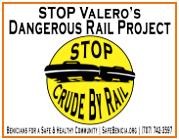Repost from The Root Word, ForestEthics Blog
[Editor: See also the earlier Associated Press story: Railroad Regulators Fail to Pursue Criminal Prosecution of Hazardous Cargo Safety Violations. – RS]
News Analysis: Inspector General Cites Failure of Federal Railroad Administration on Oil Train Safety
By Matt Krogh, March 2, 2016
In a scathing critique, the US Department of Transportation Inspector General called out the Federal Railroad Administration (which is an agency within DOT) for failing to adequately evaluate or reduce the risks of a catastrophic oil train accident to the American public. The conclusion: The FRA is failing to provide adequate oversight and policing of oil trains, and FRA fails to enforce the rules or prosecute violators when they find dangerous violations.
Oil trains are too dangerous for the rails. The Inspector General makes this point in the first sentence of the review, citing the fatal Lac Megantic oil train disaster. But we’ve heard from far too many local, county, and state officials around the country who believe the federal government is overseeing oil trains and guaranteeing public safety. It’s true that century-old railroad law puts railroads under federal control. That makes sense because a continental railroad system would grind to a halt if it was regulated by thousands of different local and state government entities. But no one should let “pre-emption” or federal-control get in the way of local permitting decisions, especially when it comes to public safety. Especially when it comes to preventing a calamity that could reduce another town to ashes.
This Inspector General report makes it clear the FRA is failing the American people with a good cop/good cop approach when it comes to mile-long oil trains carrying millions of gallons of toxic, explosive crude through US cities and towns.
Here’s some key quotes from the DOT IG report, reviewed in an excellent article by AP reporter Joan Lowy:
the Agency has no overall, national understanding of the risk environment and cannot be sure that the regions consider all appropriate risk factorsThis points to a key flaw in FRA oversight: they assume that region-based inspection systems are all that are needed, and fail to look nationally, comprehensively, at the risks of moving oil by train.
…do not take into account risk factors such as the condition of transportation infrastructure, the shippers’ compliance histories, or the proximity of transportation routes to population centers.This begs the question, what does the FRA look at in risk assessment? Track conditions, how good the individual railroads are at safety, and how close people are living to oil train routes seem pretty important.
FRA issues few violations, pursues low civil penalties, and does not refer possibly criminal violations to the office of inspector generalThe FRA turns a blind eye to criminal violations, settles for low fines, and fails to bring in the Office of Inspector General when criminal investigations are warranted. We need a bad cop, folks.
One inspector noted that the Office of Chief Counsel has effectively “numbed” a large portion of inspectors into not writing violations and stated that some inspectors have preconceived notions that violations will not get through the process.It’s true that the FRA does have inspectors — but the FRA’s buddy culture with the railroads means that hard-working inspectors on the ground have lost faith in the agency’s willingness and ability to regulate railroads.
respondents just smile and cut the checkBy respondents the Inspector General means railroads. They don’t argue with miniscule fines, but then why should they? They are happy to pay small fines as a normal operating expense, and get back to moving vast quantities of explosive, toxic crude oil through America’s population centers.
While the specific circumstances of all of these violations may not have warranted maximum penalties, FRA settled for 5.1 percent of the roughly $105.6 million dollars in penalties it could have levied…No, seriously, the fines are miniscule. FRA is only issuing 5% of the fines they could levy under the law. Wouldn’t it be nice if the highway patrol took the same approach to speeding tickets? It would, but then, the Wild West of our highways would be littered with the smoking wreckage of souped-up Camaros.
By applying the same penalty to all violations of a regulation, FRA is distancing its enforcement actions from the context of the behaviors they are meant to rectify, thus weakening penalties’ deterrent effect. Furthermore, by bundling violations, FRA’s settlement process removes penalty enforcement from the context of each violation and low penalties diminish the potential deterrent effect of the penalties set in the guidelines and the regulatory maximums.And there you have it: it doesn’t matter the scale or the number of fines you get, you can talk your way out of it in the settlement process.
The Inspector General audit of the Federal Railroad Administration found an agency that fails to understand and regulate the severe threat to 25 million Americans living in the blast zone. When it comes to oil trains the FRA seems to work for the railroad and oil industry, and not the American people. Local and state officials faced with permitting decisions need to recognize their responsibility to protect the public, just as the FRA now needs to do their job when it comes to deadly oil trains.



You must be logged in to post a comment.